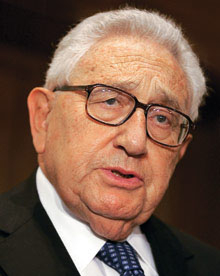THE NEW REALISM
By Michael Freedman | NEWSWEEK
Published Apr 25, 2009
From the magazine issue dated May 4, 2009
Republicans have been trying to link Barack Obama to Jimmy Carter ever since he started his presidential campaign, and they’re still at it. After Obama recently shook hands with Venezuelan strongman Hugo Chávez, GOP ideologue Newt Gingrich said the president looked just like Carter—showing the kind of “weakness” that keeps the “aggressors, the anti-Americans, the dictators” licking their chops.
But Obama is no Carter. Carter made human rights the cornerstone of his foreign policy, while the Obama team has put that issue on the back burner. In fact, Obama sounds more like another 1970s president: Richard Nixon. Both men inherited the White House from swaggering Texans, whose overriding sense of mission fueled disastrous wars that tarnished America’s image. Obama is a staunch realist, like Nixon, eschewing fuzzy democracy-building and focusing on advancing national interests. “Obama is cutting back on the idea that we’re going to have Jeffersonian democracy in Pakistan or anywhere else,” says Robert Dallek, author of the 2007 book, “Nixon and Kissinger: Partners in Power.”
Nixon met the enemy (Mao) to advance U.S. interests, and now Obama is reaching out to rivals like Chávez and Mahmoud Ahmadinejad for the same reason. “The willingness to engage in dialogue with Iran is very compatible with the approach Nixon would have conducted,” says Henry Kissinger, the architect of Nixon’s foreign policy. “But we’ll have to see how it plays out.” Hillary Clinton has assured Beijing that human rights won’t derail talks on pressing issues like the economic crisis, another sign of Nixonian hard-headedness. And echoing Nixon’s pursuit of détente, Obama has engaged Russia, using a mutual interest in containing nuclear proliferation as a stepping stone to discuss other matters, rather than pressing Moscow on democracy at home, or needlessly provoking it on issues like missile defense and NATO expansion, which have little near-term chance of coming to fruition and do little to promote U.S. security. Thomas Graham, a Kissinger associate who oversaw Russia policy at the National Security Council during much of the younger Bush’s second term, says this approach by Obama, a Democrat, resembles a Republican foreign-policy tradition that dates back to the elder George Bush and Brent Scowcroft, and then even further to Nixon and Kissinger.
It’s hard to know if such tactics will work, of course. But Obama has made clear he understands America’s limitations and its strengths, revealing a penchant for Nixonian pragmatism—not Carter-inspired weakness.
© 2009
Source: Newsweek, Apr 25, 2009



